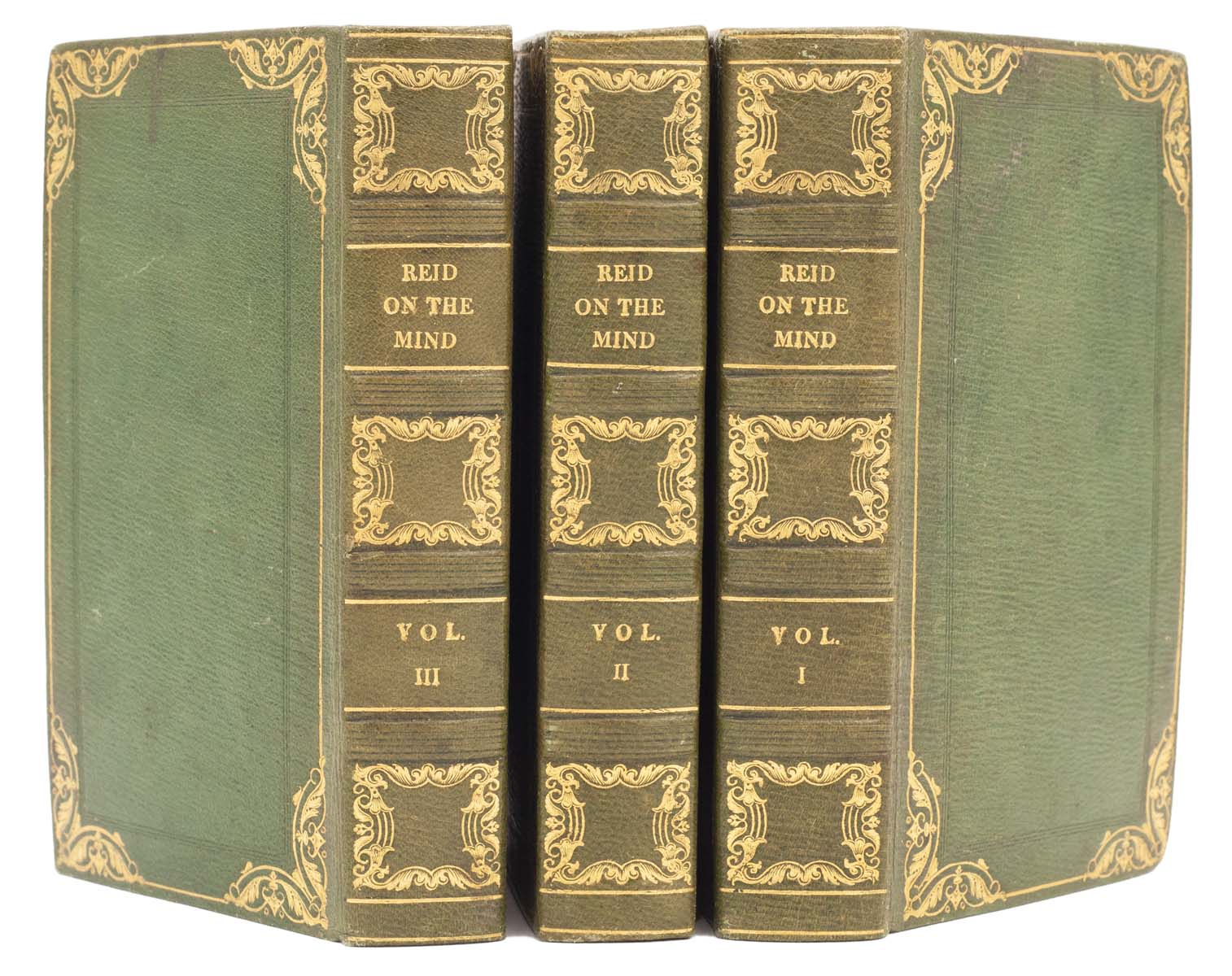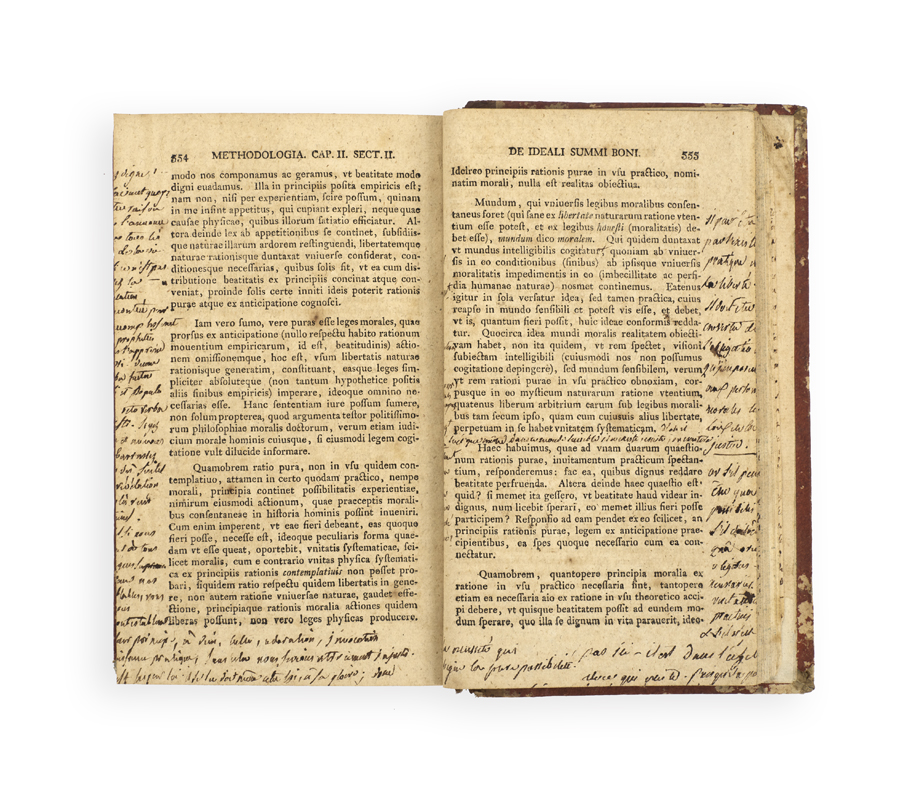




HUGUENOT EPICUREANISM
FROM THE LIBRARY OF PIERRE-DANIEL HUET
DU RONDEL, Jacques.
La vie d’Épicure.
Paris, Antoine Cellier, 1679.
12mo, pp. [2 (blank)], [10], 81, [2], [1 (blank)]; woodcut ornament to title, woodcut headpieces and initials; a very good copy in contemporary speckled calf, spine gilt in compartments and lettered directly in gilt, edges speckled red; corners somewhat worn, joints split but holding, endcaps chipped; arms of Pierre-Daniel Huet blocked in gilt to each board (see below), with ink acquisition note ‘18 juin 1679’ (likely in Huet’s hand) to verso of rear free endpaper and inscription ‘D. de P. 438.’ to blank a1 verso, his engraved armorial donation plate dated 1692 to front pastedown (upper left corner torn), seventeenth-century ink gift inscription at the head of title, printed label ‘Ne extra hanc bibliothecam efferatur. Ex obedientia.’ (Not to be removed from this library, out of obedience) pasted to foot of title, seventeenth-century printed pressmark label to front pastedown.
First edition of Du Rondel’s Life of Epicurus, a seminal work in the study of eighteenth-century Epicureanism; an important copy, from the distinguished library of Pierre-Daniel Huet.
While Des Coutures’s La morale d’Epicure claimed that Epicurean philosophy posed no dangers to anyone with real faith, being in fact an edifying encounter for anyone who wished to see how far both to and from truth an excellent mind might travel ‘without lights [of faith] amid the shadows’, ‘the Huguenot Jacques Du Rondel’s La vie d’Epicure (1679) had gone even farther, presenting as its own Diogenes Laërtius's view of Epicurus’s “ineffable piety … and … profound respect for the gods, which composed the most considerable portion of his virtue.” For Du Rondel, Epicurus had added the unpredictable “declension,” that is, swerve, of the atoms to Democritus’s physical theory in order to save free will. Epicurus’s great popularity had displeased other ancient philosophers, above all the Stoics, Du Rondel explained, and they jealously had slandered him, accusing this chaste and pious man of voluptuous depravity and irreligion. While Epicurus was wrong to believe that divine perfection was incompatible with governance in physics, he and Lucretius, Du Rondel insisted, both believed in gods who “concerned themselves” with the morality of the world, and there also had been sincere Christians who believed, however erroneously, that God exercised His providence only in matters of ethics and theology, not in physics’ (Kors, p. 10).
Jacques Du Rondel (c. 1630–1715) was professor of Rhetoric and Greek at the Huguenot Academy in Sedan, where he had Abraham De Moivre among his students, and taught alongside Pierre Bayle, at that time professor of Philosophy. Following the Academy suppression in 1681 ordered by Louis XIV as part of his policy of repression of French Protestantism, Du Rondel became professor of Belles-lettres at the University of Maastricht.
Provenance: Pierre-Daniel Huet (1630–1721), Bishop of Soissons and later of Avranches, was a French scholar, antiquary, scientist, and philosopher, one of the most brilliant and renowned intellectuals during the reign of Louis XIV, ‘whose incisive skepticism, particularly as embodied in his cogent attacks on René Descartes, greatly influenced contemporary philosophers’ (Britannica), making him a leading proponent of fideism.
Huet’s father was a convert from Calvinism, but he was nonetheless educated by a Protestant pastor as his tutor during some of his first academic years. He studied at the Jesuit school in his native Caen, before moving to Paris where he forged a close friendship with Gabriel Naudé, librarian of the Mazarin Library. In 1652 he visited the court of Queen Christina of Sweden, in whose library he discovered some fragments of a commentary on St Matthew by Origen, a discovery which led to an edition of Origen in 1668. He later assisted the French bishop Jacques Bossuet, tutor to the Dauphin Louis, son of Louis XIV, and edited the celebrated series of Delphin Classics. Despite not being a Jesuit himself, Huet spent his last years in a Jesuit house in Paris, and bequeathed his library of some eight thousand books to the Jesuit College in Paris (as commemorated by the bookplate). Following the suppression of the Society of Jesus in France in 1764, his library was dispersed, although many of his books were incorporated into the Bibliothèque Royale (today BnF).
See Kors, Epicureans and Atheists in France, 1650-1729 (2016), and Shelford, Transforming the Republic of Letters: Pierre-Daniel Huet and European Intellectual Life, 1650-1720 (2007).
No copies traced in the US. Library Hub finds a single copy in the UK, at Worcester College Oxford. OCLC locates only a handful of copies outside France (a single copy each in Switzerland, Germany, Denmark, Sweden, Italy, and the Netherlands).

